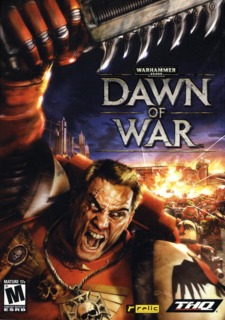As good (and as violent) as real-time strategy ever gets.
But if anything can be said about the Tau and the Necrons -the newcomers in Dark Crusade-, is that they are anything but dull. The Tau are a race of high-tech troopers sporting badass energy rifles and arrayed in power armors seemingly taken straight out of some anime, who are bent on bringing "the Greater Good" to the universe - inviting other races to join their Empire and ruthlessly crushing those who defy them. While mediocre meleers even in the best case scenario, Tau are the best ranged combatants in the game - not in vain one of the game's trailers is entitled 'Tau Meat Grinder.'
On the other corner, surrounded by an aura of mystery and dread, stand the Necrons. An ancient army of metallic, skeletal warriors that has lain dormant for 65 million years, they are slowly awakening from their long slumber and readying the harvest of fresh bodies to feed to their hungry, genocidal gods. The drool-inspiring intro does them justice: they are the most resilient and durable of all factions, not only on a unit-per-unit basis but also as a whole as well - some of them have the ability to teleport to any Necron structure, a power that allows them to excel both on offense and defense. Such powerful newcomers prompts for enhancing the other factions as well--and boy, do they get boosted. Grey Knights, Heavy Weapons teams, Flash Gitz, Daemon Princes and Harlequins are much welcome additions to the game as each one addresses weaknesses of their respective armies; an extensive scrubbing of tech trees and unit statistics further enhances each faction's capabilities while preserving their distinct ways of waging war - as well as preventing players from fielding entire armies composed by a single unit. Still, some further refinement is in order, especially with the Necrons - for example, the Wraiths are next to useless since their 'squads' are comprised by only one member, with limited hit points and morale and mediocre damage, while Necron Warriors are ridiculously tough, deadly, and free. Yes, free.
It is worth noting that, while more difficult, it still pays off to rush, since allowing the enemy to build up a large infrastructure with which to quickly replace its losses will result into an almost endless war of attrition--a morass most players will want to avoid. This is evident even in the single player campaign, especially when assailing territories -other than strongholds- where the enemy is heavily entrenched. While all the juicy additions automatically guarantee many hours of mayhem, one of the coolest features of Dark Crusade is its campaign model, which is based on a world map divided into territories, each one granting different bonuses to their controllers--some of them allow their owner to train 'honor guard' units, small cadres of elite troops that are ready to wage war the moment a new battle begins, while others confer special abilities, such as being able to attack twice in a turn or to strike at any territory in the map save enemy strongholds. This provides for a very dynamic single-player experience, because the player dictates the course of the campaign; while it has some notorious shortfalls (it is not possible to fight more than one faction in the same territory, nor to play the campaign in multiplayer mode, and the skirmish-like invasions and defences get repetitive and dull later on), it is very good nonetheless, and reminiscent to old gamers of classics such as Westwood's Dune 2 and Command & Conquer.
Graphics-wise, other than the new units, factions, and scenarios, Dark Crusade does not pack a great deal of new stuff. Not that it needs to, anyway. All units have been scrupulously polished so as to look less angular when fully zoomed in; it is as exhilaratingly addictive as always to send your cam right into the fray and watch the bloodfest. Sound effects remain the weakness of the game; many weapon blasts sound underpowered, with a few notable exceptions - the dreaded Monolith and the awesome humming of the Hammerhead's heavy railgun among them. Voice acting is excellent, with many memorable lines; Necrons have nothing in the way of speech, though, uttering only electronic sounds or guttural hisses when given orders. In the end, Dark Crusade is a welcome addition that breathes new life into a classic; one can only excitedly think what surprises are in store for us for the moment when the two factions from the tabletop game that have not yet entered Dawn of War finally do join the fray - namely, the abhorrent and thoroughly cruel and evil Dark Eldar, and the alien, emotionless, living engine of war that are the Tyranids.

